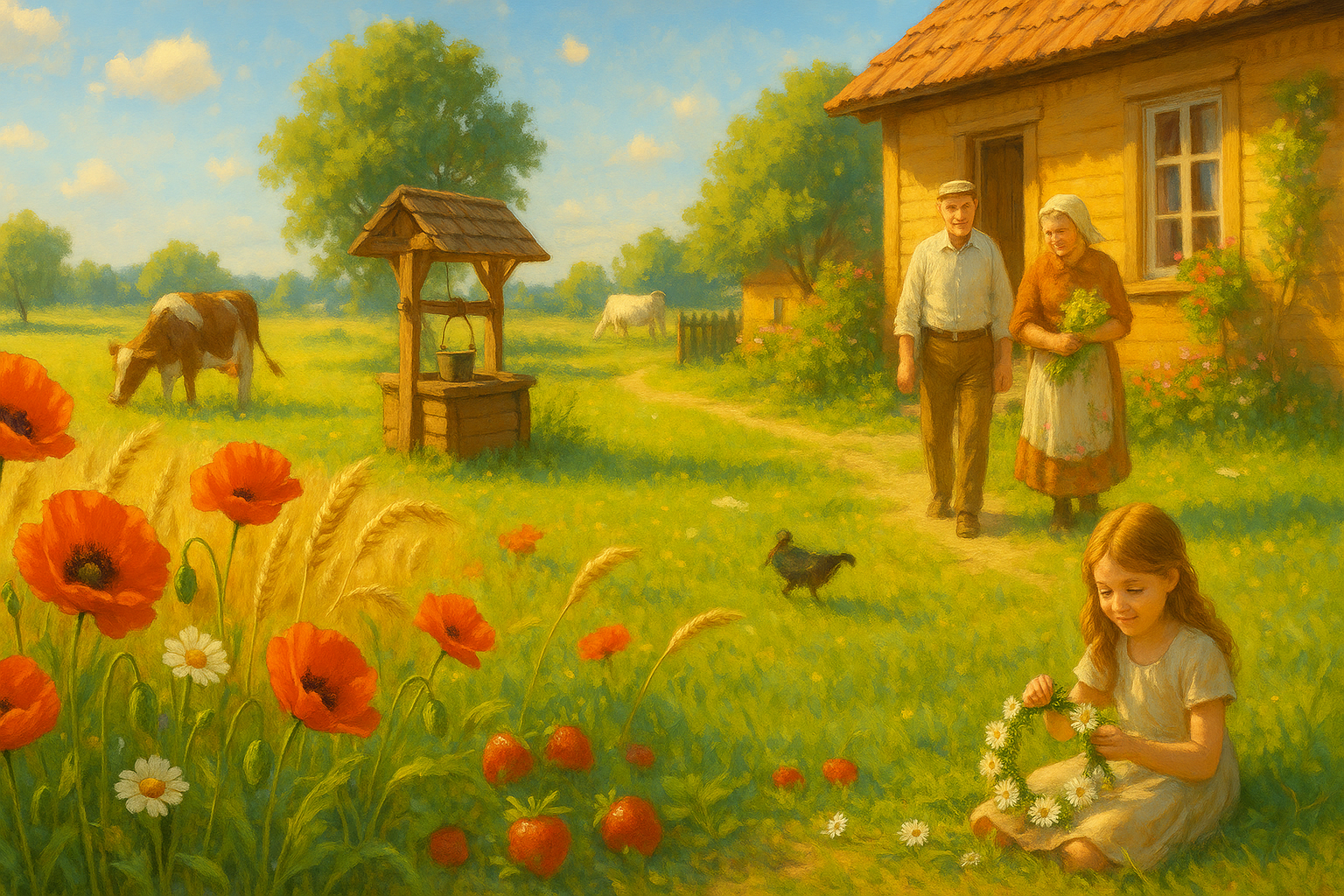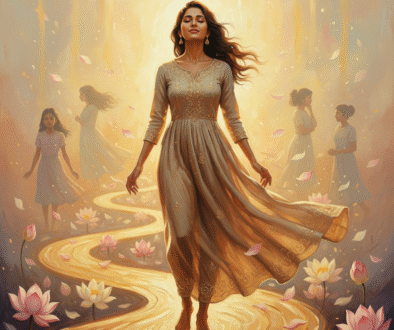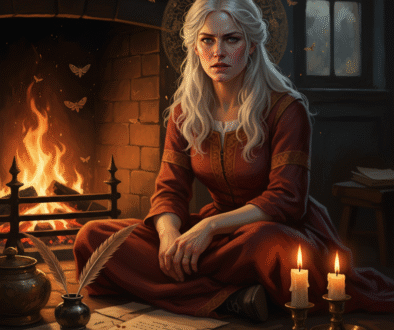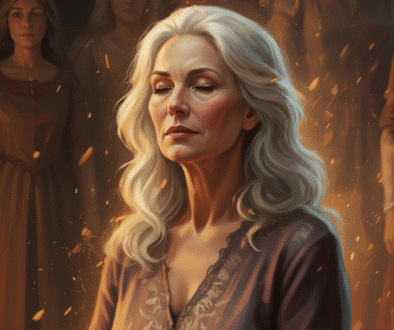
A Return to the Land of Childhood
The Chicken That Took Me Home: A Journey into Memory
It was just an ordinary day. Quiet, uneventful, with no hint that anything would stir my soul. And yet, all it took was one message. One photograph. Sent by a friend from far away – a simple picture, unassuming, showing nothing more than a chicken standing in grass. But that image opened something inside me. As if it were the key to a drawer I hadn’t touched in years. And in that moment, everything came rushing back. Images, scents, sounds – a world that still lived somewhere deep within me, waiting for the spark. Suddenly, I was back. Back home. Back on the path my bare feet knew by heart. Back in a childhood no one could take away from me.
I remember that path so well – sandy, grassy, warm under the sun, leading from the bus stop all the way to Grandma’s house. I would run down it as fast as I could, and there she was, standing at the end, arms wide open, scarf tied on her head. Her smile held everything – love, waiting, joy, and relief. Her hug smelled of flour, grass, and something else – something I still can’t name, but have never forgotten. Perhaps it was the scent of being safe.
The yard was always neat – Grandpa swept it with care, as if tending to sacred ground. His broom hissed gently across the dirt. And then came the sound of the rooster – proud and loud. That same rooster who sometimes chased me just for fun. I’d scream, half-laughing, half-terrified, and when I looked back, he would stop, crow triumphantly, and I swear he was laughing. “Grandma, help!” I’d cry. And I’d run straight into her arms.
Behind the house, potatoes boiled away in a giant steamer meant for feeding animals. But to me, they were treasure. I’d sneak over, grab one hot from the pot, burn my fingers – and not care. With a dab of butter, they tasted like nothing else in the world. Life back then had the taste of earth, fire, and hands that worked with love.
And then the bread – warm, fragrant, crusty. Mum always said I had to wait for it to cool, or it would upset my stomach. But I never waited. The end piece, soaked with melting butter running down my fingers like liquid gold – that was happiness. Add honey fresh from Grandpa’s hives, and warm milk straight from the cow, and I knew no richer meal could ever exist.
The orchard was a wonderland. Pears, apples, cherries, sour cherries, red and black currants. Rhubarb was too tart, but we dipped it in sugar and ate it anyway, our faces scrunching with joy. We plucked currants straight from the bushes, no washing needed. Bees and wasps buzzed near, but we waved them away without fear. They were just part of summer’s song.
The paper apples – light and crisp – bent the branches with their weight. We picked them by the bucket, ate until our bellies were full. Grandma made jams from them, sealing the taste of summer in jars for winter. And the compote – chilled in a bucket of well water – it was sweeter than anything. That well water sparkled like diamonds in the sun, clearer and purer than any bottle could promise.
Grandma would lower milk in tin cans into the well to keep it cold. At dawn, she set them by the road for the milkman. It was a rhythm – quiet, honest, beautiful. And then came the harvest. The whole family gathered. We helped, we laughed, we slid down piles of hay like wild things. We’d lie on the hay, staring at clouds, saying what they looked like. Grandma brewed Inka coffee in a jug and brought it out to the field. We drank it together, and even though the same coffee waited in a pot at home, it never tasted the same. This one tasted of dust, sunlight, and togetherness.
One day – I remember it like it was yesterday – Halina and I were walking down the road when we saw an old cart pulled by a tired-looking horse. An elderly man sat up front, wearing a cap, his face weathered by years of sun. We waved to stop him. When he drew closer, I called out, “Would you mind giving us a ride for a bit?” He looked at us with kind eyes, smiled and nodded. “Hop on, girls,” he said, “Just hold on tight.” So we climbed up. The horse clopped steadily along, dust rising behind us, and the air was thick with the smell of hay and freedom. We sat on the wooden boards, chatting and laughing with the man, feeling like explorers setting out to conquer the world. That small moment felt infinite. It filled us to the brim.
And speaking of carts – I remember the big one piled high with hay. Everyone would climb on top to ride home from the field. I was there too, clinging on as tightly as I could, while someone kept calling, “Hold on, you’ll slide off!” But we weren’t scared. We were one. All of us. One family. One laughter. So much joy and courage in that one ride.
When I look at the Polish countryside now, I feel something missing. Where are the horses in the fields? The cows grazing peacefully? The chickens scratching the earth, pecking at scattered grain? The village has changed. It’s quieter, more orderly. But the old village – full of noise, color, life – now lives only in my memory. Yet it’s still there, fresh as ever.
We walked barefoot. It was healthy, they said. We just had to watch for bees. We’d sit on the steps, eating strawberries – even with grains of sand. We picked raspberries straight from the bushes, sometimes sneaking into a neighbor’s garden, giggling and racing away, hearts pounding. And yes – stolen fruit really did taste better.
With Halina, we could talk for hours. The world had no end. Grandpa once built me a little house made from blankets. Inside was a jar with a meadow flower, a few treasures, our whispered secrets. We believed that if no one could see us, no one could hear us either. And all those secrets floated into the world through the soft fabric.
The storms… they were powerful. Sometimes lightning struck a tree or a power pole, and the lights went out. We’d sit by candlelight while Grandma prayed and placed a blessed candle in the window. Grandpa, of course, would be on the bench outside, counting the seconds between flash and thunder. “It’s far now,” he’d say calmly. Grandma would scold him, “You crazy old man! Come inside before lightning strikes you!” But he’d just smile and sit a while longer.
I remember the grain – rye and wheat – swaying in the wind like it was saying hello. I used to walk into the fields and make little paths. Grandpa would frown later and say, “Who trampled the grain?” And I’d say, boldly, “I did.” He’d shake his head and say it made cutting harder. But he knew. And he understood.
All of this – every little detail – came flooding back from one photo. Just a chicken in grass. So small a thing. And yet so much. I went back. Not with my body, but with my soul. And I know I will return again and again. Because in those memories, there is home. And there is no place more real than that.


